新概念英语第一册第49-50课课件(共41张PPT)
文档属性
| 名称 | 新概念英语第一册第49-50课课件(共41张PPT) | 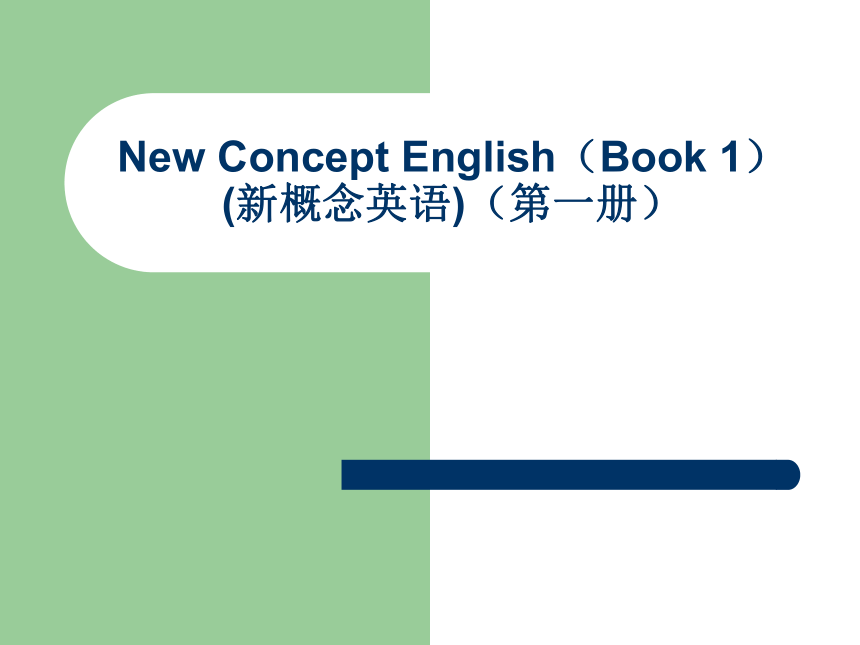 | |
| 格式 | ppt | ||
| 文件大小 | 3.7MB | ||
| 资源类型 | 教案 | ||
| 版本资源 | 新概念英语 | ||
| 科目 | 英语 | ||
| 更新时间 | 2023-10-06 13:32:40 | ||
图片预览

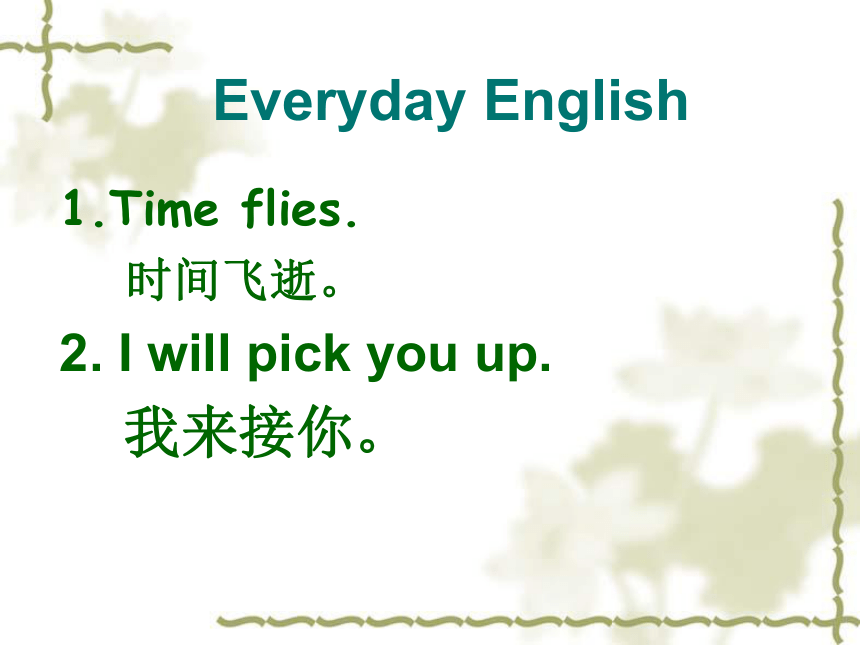
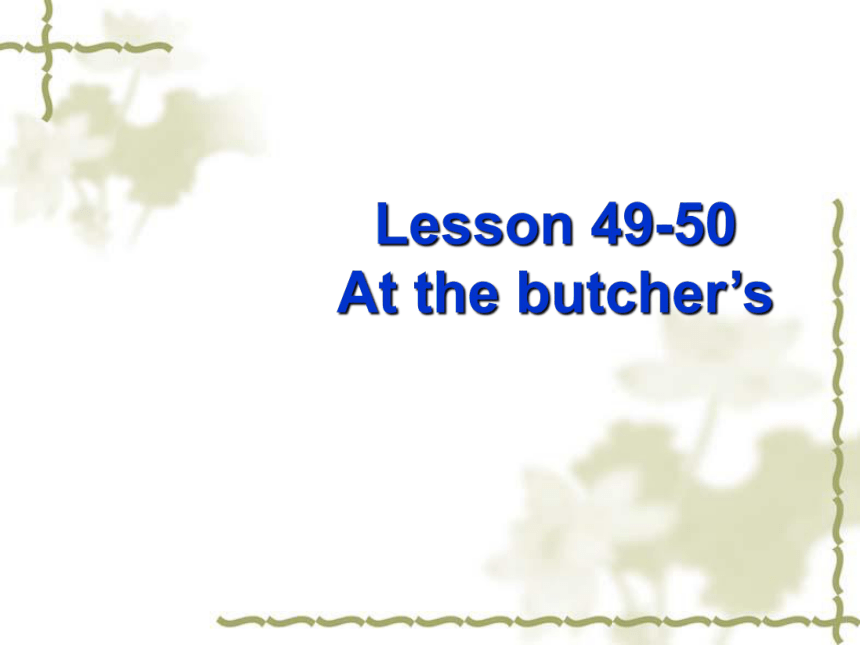
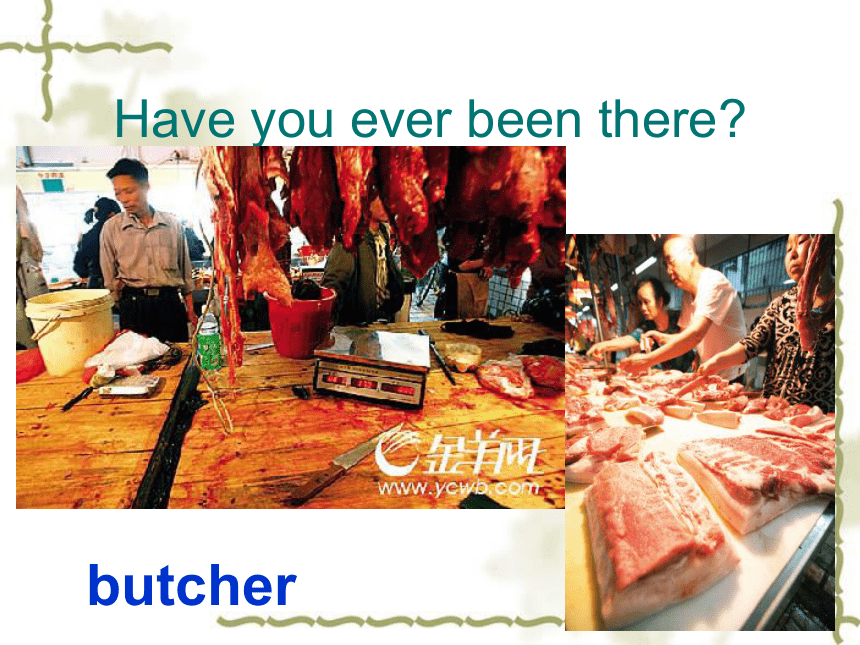
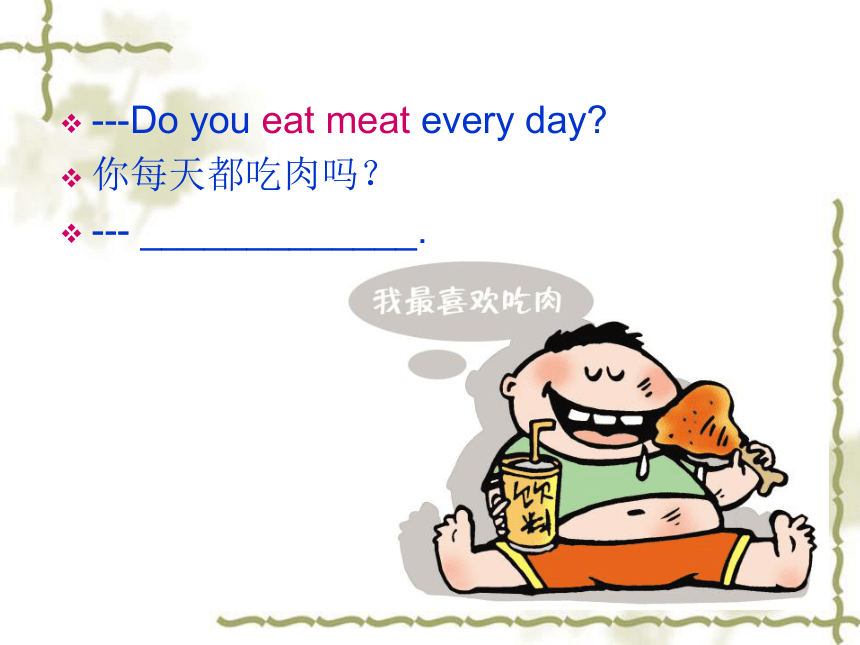
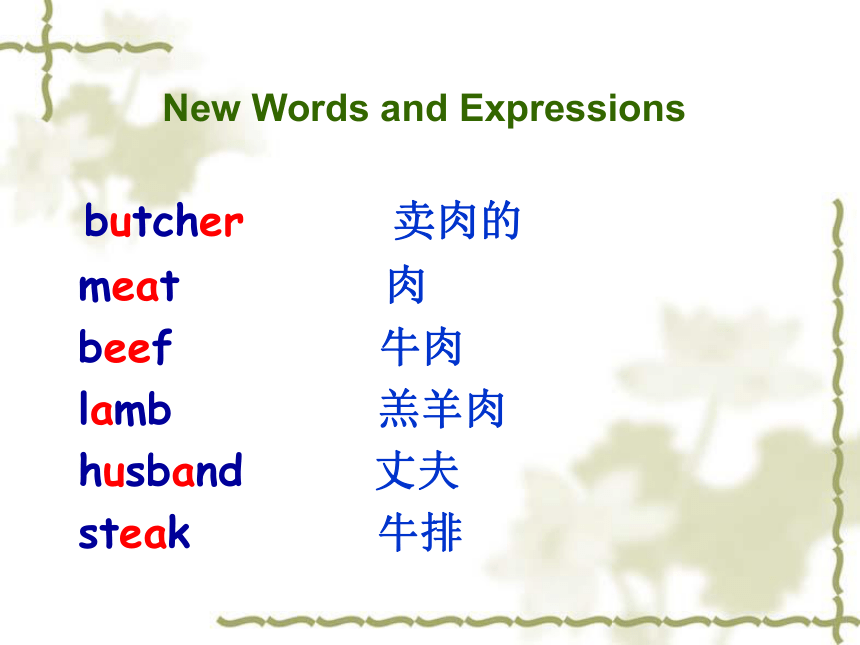
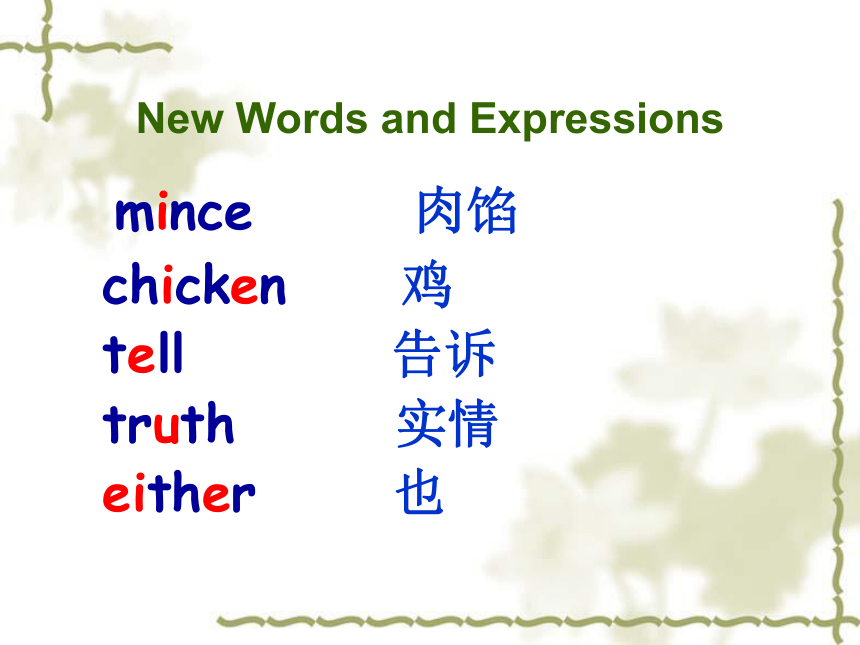
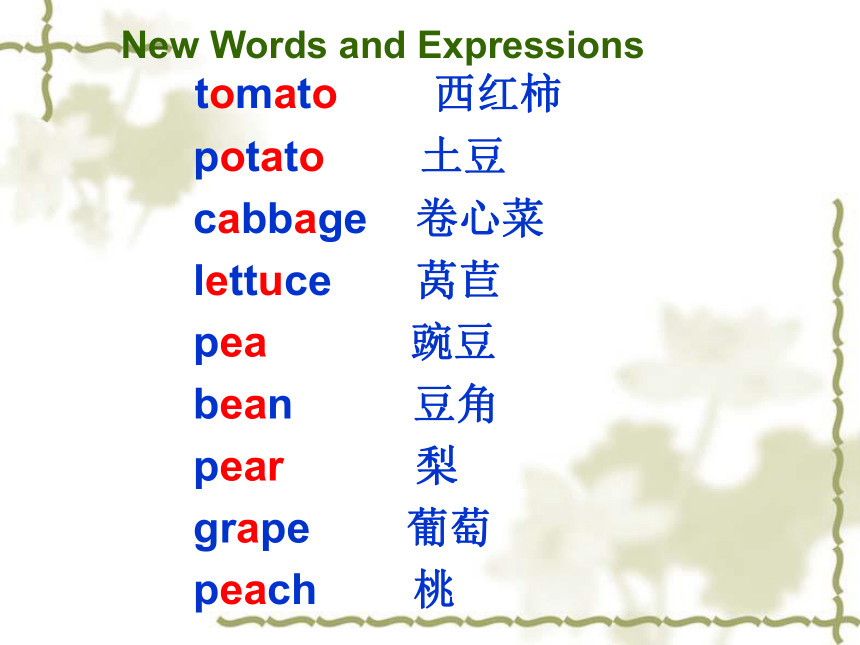
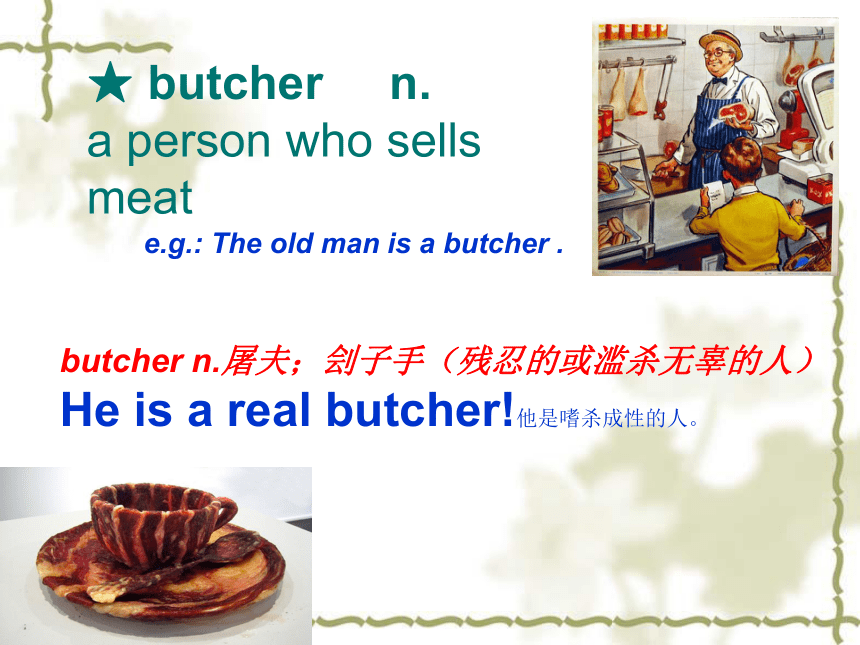
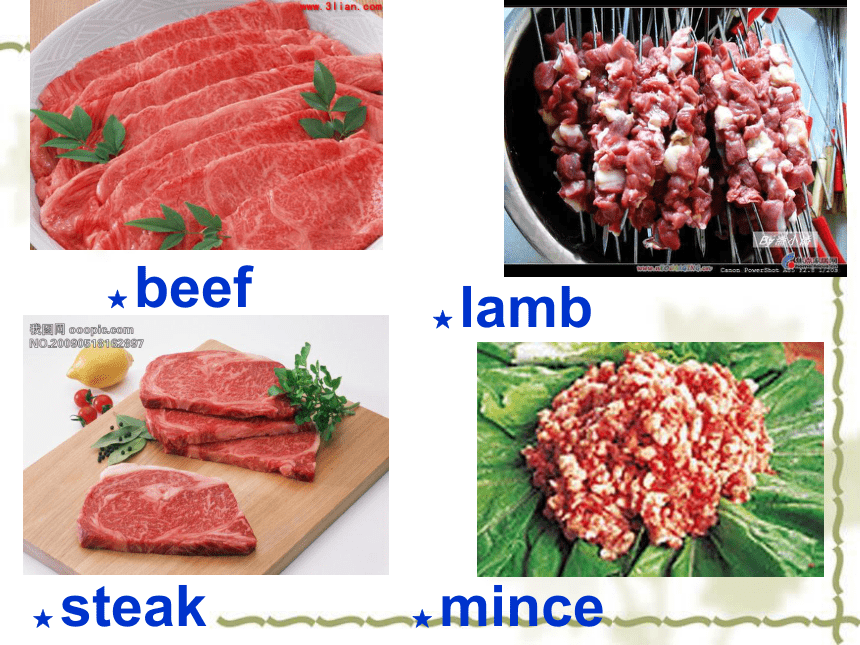
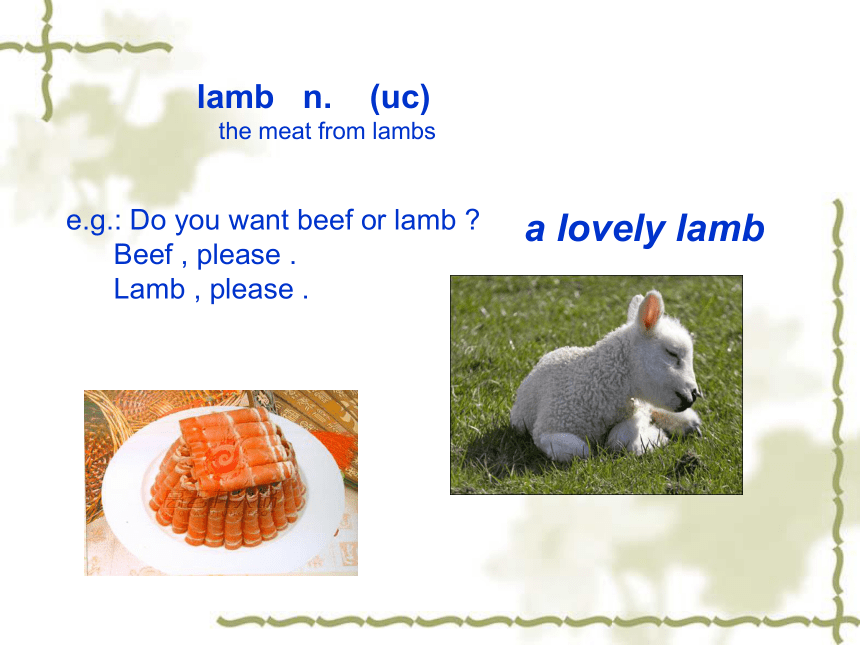
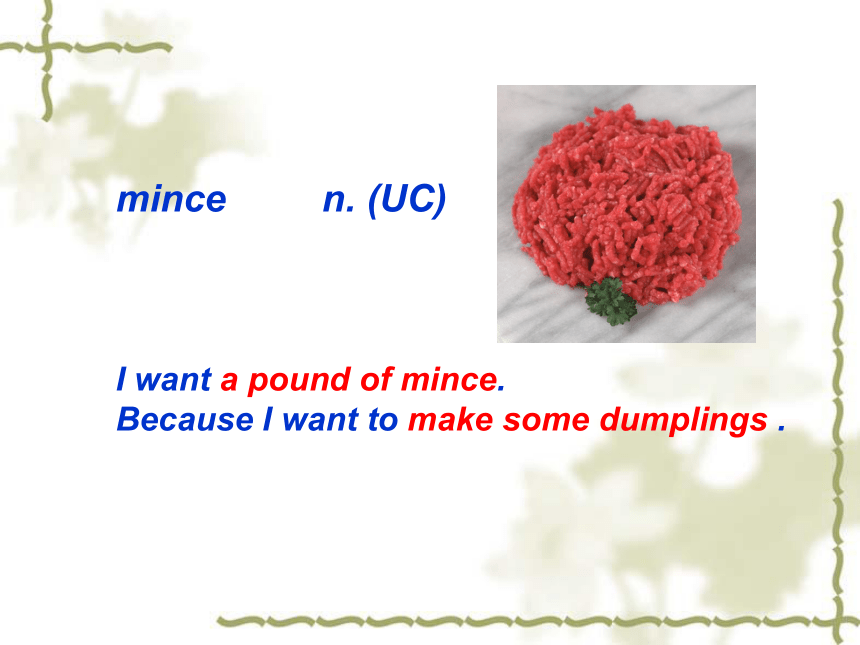
文档简介
(共41张PPT)
New Concept English(Book 1)
(新概念英语)(第一册)
Everyday English
1.Time flies.
时间飞逝。
2. I will pick you up.
我来接你。
Lesson 49-50
At the butcher’s
Have you ever been there
butcher
---Do you eat meat every day
你每天都吃肉吗?
--- _____________.
New Words and Expressions
butcher 卖肉的
meat 肉
beef 牛肉
lamb 羔羊肉
husband 丈夫
steak 牛排
mince 肉馅
chicken 鸡
tell 告诉
truth 实情
either 也
New Words and Expressions
New Words and Expressions
tomato 西红柿
potato 土豆
cabbage 卷心菜
lettuce 莴苣
pea 豌豆
bean 豆角
pear 梨
grape 葡萄
peach 桃
★ butcher n.
a person who sells meat
e.g.: The old man is a butcher .
butcher n.屠夫;刽子手(残忍的或滥杀无辜的人)
He is a real butcher!他是嗜杀成性的人。
★ beef
★ lamb
★ steak
★ mince
lamb n. (uc)
the meat from lambs
e.g.: Do you want beef or lamb
Beef , please .
Lamb , please .
a lovely lamb
mince n. (UC)
I want a pound of mince.
Because I want to make some dumplings .
chicken n.
★ chicken n.鸡,鸡肉
cock [k k]公鸡
hen [hen]母鸡
chick [t ik]小鸡
wife
husband
tell v.告诉,说
to tell you the truth ……说老实话
To tell you the truth , I don't want to tell you this .
truth n.实情,事实
true adj. 真实的
come true 梦想成真
either一般用于否定句,位于句末,前面通常有逗号。
too常用于肯定句,有时也用于疑问句,但不能用于否定句。常见于句末,too前常有逗号;如果不在句末,too前后都应当有逗号。
also 用于肯定句中,位于居中
either adv.也(用于否定句)
I don’t like him, either!
You have a car, me too!
bean
pea
potato
tomato
pear
peach
lettuce
cabbage
grape
Listening
1 What did Mrs. Bird buy
2 Listen to the tape, and then judge the sentences. If it is right, please say yes. If it is wrong, please say no.
Mrs. Bird like lamb.
Mrs. Bird’s husband
like lamb too.
3. Mrs. Bird like chicken.
4.Mrs. Bird doesn’t like chicken.
5. Mrs. Bird’s husband
doesn’t like steak.
Yes
No
Yes
No
No
At the butcher’s
方位副词at与in的区别是,at和in在…里;但at表示的地方较小,而in表示的地方很大,例:
at the school
at home
in China
in Asia
in Changzhou
Detailed study about the passage
Do you want beef or lamb
or 或者,还是(表示选择)
Do you want beer or wine
Beer , please .
Wine , please .
Do you want an apple or a banana
An apple , please .
A banana , please .
What about some steak
来点牛排怎么样?
=How about 怎么样?/如何?
-You don’t like beef What about pork Or lamb
What about him
What about tomorrow
How about watching TV
What about playing football
To tell you the truth,
I don’t like chicken, either.
动词不定式作插入语,所谓动词不定式就是to +verb.的形式
动词不定式不可以作谓语,但可做其它句子成份。例:
To say is one thing, to do is another thing. 说一套做一套。(动词不定式作主语)
To be or not to be, that’s a question.
生存还是毁灭?这是个问题。 ---Shakespeare
Grammar
助动词 do, does
在英语中,助动词一般没有词义,主要帮助构成谓语,表示时态,语态或构成疑问及否定。
do :主语为 I, you及复数时。
do not = don’t (否定形式)
does :主语为第三人称单数时。
does not = doesn’t (否定形式)
3. 我不喜欢Sonic.
I don’t like Sonic.
4. 她不喜欢Sonic.
She doesn’t like Sonic.
don’t = do not
doesn’t = does not
5. 你喜欢Tank吗?
她喜欢Tank 吗?
Do you like Tank
Does she like Tank
肯定句
主语+动词~
我每天说英语。
I speak English every day.
他每天说英语。
He speaks English every day.
注:主语是第三人称单数时,动词要加s,或es
否定句
主语+don’t / doesn’t +动词~
在助动词后加not
我不是每天说英语。
I don’t speak English every day.
他不是每天说英语。
He doesn’t speak English every day.
疑问句将助动词提前
Do / Does + 主语+动词~
你每天说英语吗?
Do you speak English every day
他每天说英语吗 ?
Does he speak English every day
我喜欢牛奶。
我不喜欢牛奶。
他喜欢苹果。
他不喜欢苹果。
1. I like milk.
2. I don’t like milk.
3. He likes apples.
4. He doesn’t like apples.
你有钱吗?
她有钱吗?
他们有手机吗?
你们有书吗?
1. Do you have money
2. Does she have money
3. Do they have cell phones
4. Do you have books
New Concept English(Book 1)
(新概念英语)(第一册)
Everyday English
1.Time flies.
时间飞逝。
2. I will pick you up.
我来接你。
Lesson 49-50
At the butcher’s
Have you ever been there
butcher
---Do you eat meat every day
你每天都吃肉吗?
--- _____________.
New Words and Expressions
butcher 卖肉的
meat 肉
beef 牛肉
lamb 羔羊肉
husband 丈夫
steak 牛排
mince 肉馅
chicken 鸡
tell 告诉
truth 实情
either 也
New Words and Expressions
New Words and Expressions
tomato 西红柿
potato 土豆
cabbage 卷心菜
lettuce 莴苣
pea 豌豆
bean 豆角
pear 梨
grape 葡萄
peach 桃
★ butcher n.
a person who sells meat
e.g.: The old man is a butcher .
butcher n.屠夫;刽子手(残忍的或滥杀无辜的人)
He is a real butcher!他是嗜杀成性的人。
★ beef
★ lamb
★ steak
★ mince
lamb n. (uc)
the meat from lambs
e.g.: Do you want beef or lamb
Beef , please .
Lamb , please .
a lovely lamb
mince n. (UC)
I want a pound of mince.
Because I want to make some dumplings .
chicken n.
★ chicken n.鸡,鸡肉
cock [k k]公鸡
hen [hen]母鸡
chick [t ik]小鸡
wife
husband
tell v.告诉,说
to tell you the truth ……说老实话
To tell you the truth , I don't want to tell you this .
truth n.实情,事实
true adj. 真实的
come true 梦想成真
either一般用于否定句,位于句末,前面通常有逗号。
too常用于肯定句,有时也用于疑问句,但不能用于否定句。常见于句末,too前常有逗号;如果不在句末,too前后都应当有逗号。
also 用于肯定句中,位于居中
either adv.也(用于否定句)
I don’t like him, either!
You have a car, me too!
bean
pea
potato
tomato
pear
peach
lettuce
cabbage
grape
Listening
1 What did Mrs. Bird buy
2 Listen to the tape, and then judge the sentences. If it is right, please say yes. If it is wrong, please say no.
Mrs. Bird like lamb.
Mrs. Bird’s husband
like lamb too.
3. Mrs. Bird like chicken.
4.Mrs. Bird doesn’t like chicken.
5. Mrs. Bird’s husband
doesn’t like steak.
Yes
No
Yes
No
No
At the butcher’s
方位副词at与in的区别是,at和in在…里;但at表示的地方较小,而in表示的地方很大,例:
at the school
at home
in China
in Asia
in Changzhou
Detailed study about the passage
Do you want beef or lamb
or 或者,还是(表示选择)
Do you want beer or wine
Beer , please .
Wine , please .
Do you want an apple or a banana
An apple , please .
A banana , please .
What about some steak
来点牛排怎么样?
=How about 怎么样?/如何?
-You don’t like beef What about pork Or lamb
What about him
What about tomorrow
How about watching TV
What about playing football
To tell you the truth,
I don’t like chicken, either.
动词不定式作插入语,所谓动词不定式就是to +verb.的形式
动词不定式不可以作谓语,但可做其它句子成份。例:
To say is one thing, to do is another thing. 说一套做一套。(动词不定式作主语)
To be or not to be, that’s a question.
生存还是毁灭?这是个问题。 ---Shakespeare
Grammar
助动词 do, does
在英语中,助动词一般没有词义,主要帮助构成谓语,表示时态,语态或构成疑问及否定。
do :主语为 I, you及复数时。
do not = don’t (否定形式)
does :主语为第三人称单数时。
does not = doesn’t (否定形式)
3. 我不喜欢Sonic.
I don’t like Sonic.
4. 她不喜欢Sonic.
She doesn’t like Sonic.
don’t = do not
doesn’t = does not
5. 你喜欢Tank吗?
她喜欢Tank 吗?
Do you like Tank
Does she like Tank
肯定句
主语+动词~
我每天说英语。
I speak English every day.
他每天说英语。
He speaks English every day.
注:主语是第三人称单数时,动词要加s,或es
否定句
主语+don’t / doesn’t +动词~
在助动词后加not
我不是每天说英语。
I don’t speak English every day.
他不是每天说英语。
He doesn’t speak English every day.
疑问句将助动词提前
Do / Does + 主语+动词~
你每天说英语吗?
Do you speak English every day
他每天说英语吗 ?
Does he speak English every day
我喜欢牛奶。
我不喜欢牛奶。
他喜欢苹果。
他不喜欢苹果。
1. I like milk.
2. I don’t like milk.
3. He likes apples.
4. He doesn’t like apples.
你有钱吗?
她有钱吗?
他们有手机吗?
你们有书吗?
1. Do you have money
2. Does she have money
3. Do they have cell phones
4. Do you have books
同课章节目录
